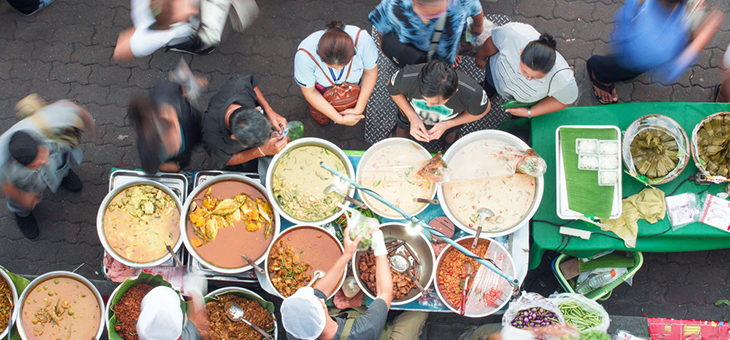Whether it’s sampling a fragrant Brie in France or chowing down on noodles fresh from a Vietnamese food stand, trying new foods is a wonderful part of any overseas trip. However, when it comes to eating local cuisines, sometimes our tummies aren’t up to the challenge.
Stomach upsets, food intolerances and even food poisoning are all too common. So, to help you avoid spending your holiday running for the bathroom, here’s a handy guide to the foods to be wary of when you travel overseas.
First, it’s important to note that the food you eat overseas isn’t ‘less safe’ than the food at home; sometimes, it’s simply that your body hasn’t built up a tolerance for it. Different countries use different fertilisers, which produce foreign bacteria, so it makes sense that your stomach isn’t used to them.
Food-borne diseases are a real threat to travellers. The most common ones are salmonella, E. coli and norovirus. Before travelling overseas, check the World Health Organization (WHO) website to see if your destination is currently experiencing any food-borne disease outbreaks.
Foods to watch out for while travelling:
1. Ice, water and other drinks
Contaminated water and ice are one of the leading causes of illnesses around the world. Pathogens from infected water enter the body and can cause diarrhoea (TD), rotavirus, cholera and a host of other diseases. Water contamination is more common in regions without adequate water sanitation and storage.
To avoid getting sick from contaminated water, it’s recommended that travellers drink bottled water or boiled water. You should also steer clear of ice cubes in your drinks, unless you know for sure that it’s from safe bottled water or clean tap water.
Coffee and tea are generally harmless but contaminated milk can sometimes be a problem, so tread carefully.
Beer and wine in other countries may contain more (or less) alcohol than in Australia. Drink carefully and in moderation.
2. Meat and seafood
It’s easy to get excited about multiple trips to the buffet table, but be cautious about cold meats and seafood that have been sitting exposed for long periods of time. These can quickly become contaminated with bacteria.
According to Better Health, foods that are cooked at high heat are usually safe to eat. So, you can feel confident about a fresh, hot plate of noodles straight from a wok. But you should be wary about food that has been cooked and kept warm. This is especially true of dishes with meat, including red meat and poultry.
Try to make sure that any meat you consume is freshly cooked and more on the ‘well done’ side than ‘rare’. When it comes to seafood, smaller fish tend to be safer from contamination. Fish organs and shellfish (i.e. clams, mussels and oysters) are best avoided.
3. Fresh fruit and vegetables
While they’re usually healthy food options, fresh fruit and vegetables can be rendered unsafe if rinsed in contaminated tap water, so in places where water is less safe to drink, try to eat cooked veggies.
The same rule applies for fresh fruit. If you suspect it has been washed in contaminated water, or it has been cut up by someone who wasn’t wearing gloves, feel free to leave it. Stewed and cooked fruits are generally perfectly fine.
4. Dairy products
Where possible, choose dairy products that have been pasteurised, which is the process of exposing foods to heat to eliminate pathogens and extend shelf life.
Hard cheeses are usually safe to eat, while soft cheeses and yoghurts may need to be treated carefully. Canned milk, powered milk and cream from sealed containers are all good sources and generally harmless. Be extra cautious of mayonnaise.
Have you ever become sick food while travelling? What are your tips for eating and staying healthy overseas?
Related articles:
Foods to avoid at airports
Foods to avoid so you stay regular
Five best food markets around the world

